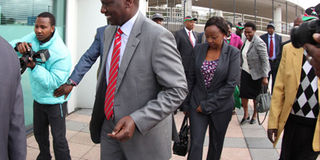ECK lit poll chaos fire: witness

PHOTO | BILLY MUTAI Deputy President William Ruto and his wife Rachel arrive at the ICC ahead of proceedings on October 9, 2013.
What you need to know:
- The witness recalled that on the evening before the presidential results were announced, police arrived at KICC and started driving people out of the ECK national tallying centre
- The witness also told the court that on the voting day, December 27, 2007, Mr Kivuitu allowed ODM presidential candidate Raila Odinga to vote after his name was not found in the voters’ roll
ICC witness 326 on Wednesday said that former police commissioner Hussein Ali and the defunct Electoral Commission of Kenya (ECK) were to blame for causing the 2007/08 post-election violence.
The witness said the violence broke out spontaneously when the then incumbent President Kibaki was declared the winner of the December 2007 election.
He told the court that initially, ECK had refused to declare the winner even through “from the way people voted and the expectation of the people it was easy to know who was the winner and people were wondering why the elections body was not announcing the winner.”
The witness recalled that on the evening before the presidential results were announced, police arrived at KICC and started driving people out of the ECK national tallying centre.
“The police commissioner (Hussein Ali) took away (Samuel) Kivuitu to State House where the results were announced and violence broke out,” the witness told the court.
Prior to the arrival of the police, he said, the atmosphere at KICC had been tense. “People were charged and very angry and trading accusations. They were wondering why ECK had not declared the winner. There were press conferences and the electoral commission also had to hold press conferences to explain why there was a delay,” the witness said.
On the spontaneity of the violence, he said: “Violence just broke out because they did not expect the results.”
On the role of the police, the witness said: “They picked the chairman (of ECK) rushed with him to State House and in less than 10 minutes declared the then incumbent the winner.”
Present at the KICC on the day, the witness said, were all the ODM pentagon members and other party leaders, MPs-elect, returning officers and the agents for ODM and PNU. Also present were journalists and party supporters “who were curious of the results.”
The witness also told the court that on the voting day, December 27, 2007, Mr Kivuitu allowed ODM presidential candidate Raila Odinga to vote after his name was not found in the voters’ roll.
“It took a lot of time and there was a lot of tension and the electoral commission chairman said he (Mr Odinga) could vote even if his name was missing,” the witness who also recalled voting and returning to the office to follow what was going on elsewhere said.
With the voting concluded, he said the results began streaming later on that day on December 27 and continued until December 30.
“The presidential results were announced last,” he said.
PROTECTIVE MEASURES
Meanwhile, the prosecution asked the trial judges at The Hague-based court to heighten protective measures for the witness including allowing him to give the remainder of his testimony in a private or closed session. The prosecution claimed that there were attempts to unmask and intimidate the witness, hence the intervention of the chamber was needed.
However, the request was opposed by the defence of Mr Ruto and radio journalist Joshua arap Sang who argued that heightening the existing protective measures would be unfair to their clients and if measures should be taken, it should be evaluated on a case-by-case basis.
“My client has done everything possible to protect the witness. We strongly urge that the case be heard in public to safeguard the rights of Mr Sang,” Mr Katwa Kigen told the court in his oral submissions.
Presiding judge Chile Eboe-Osuji said that despite the protective measures already in place including use of pseudonyms, image and voice distortions “efforts are being made to unmask the identity of the protected witness and intimidate him.”
However, he exonerated the counsels from blame in the attempts.
In opposing the application by the prosecution, Mr Karim Khan the lead defence counsel for Mr Ruto, insisted on public proceedings saying:
“We want to unmask the lies in public.” However, Mr Khan said that any person who tries to unmask the witness should be prosecuted. He also said neither his client nor the defence should be penalised for the actions of third parties.
The prosecution is continuing with the examination-in-chief of the witness on Thursday.




